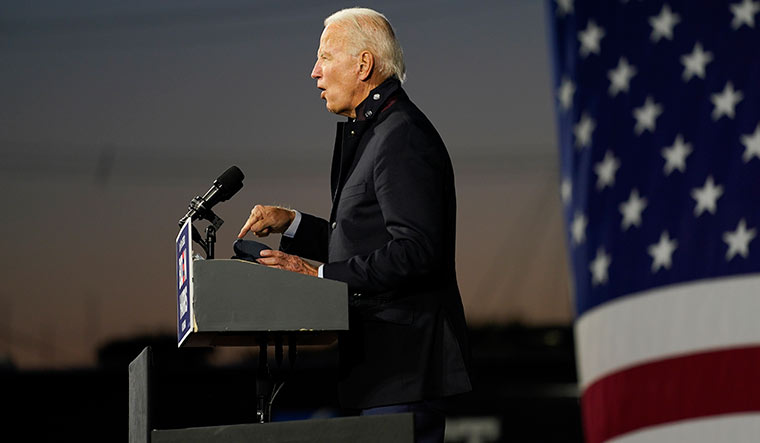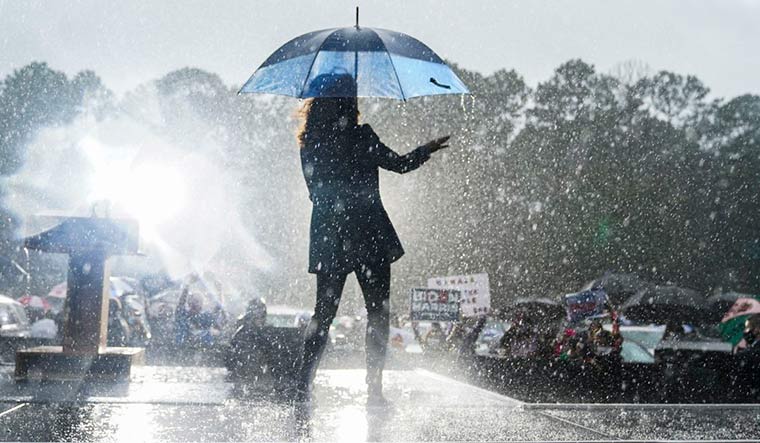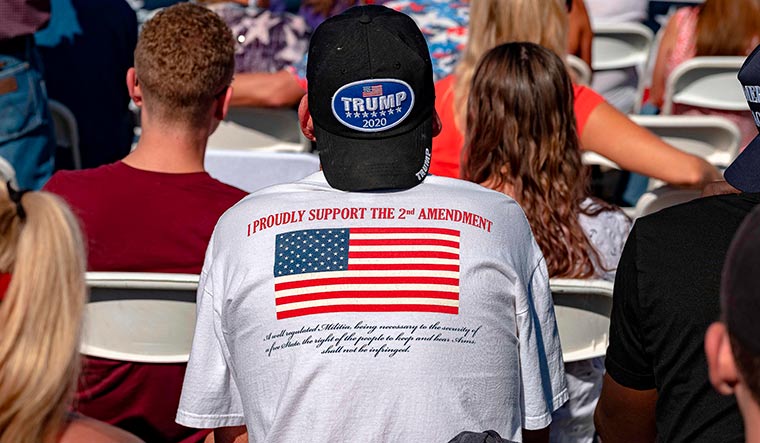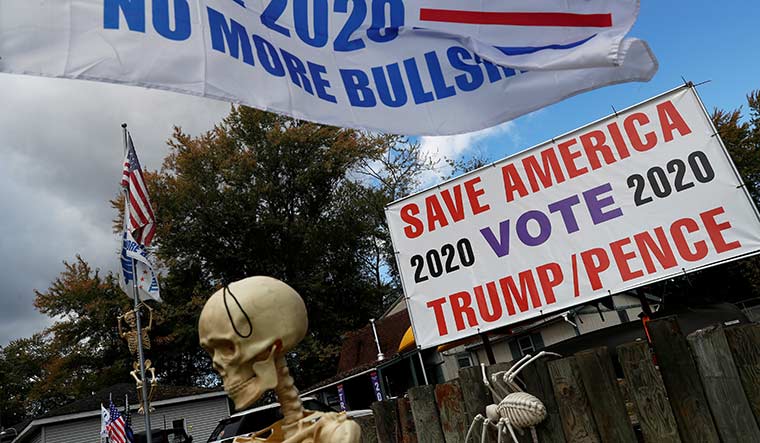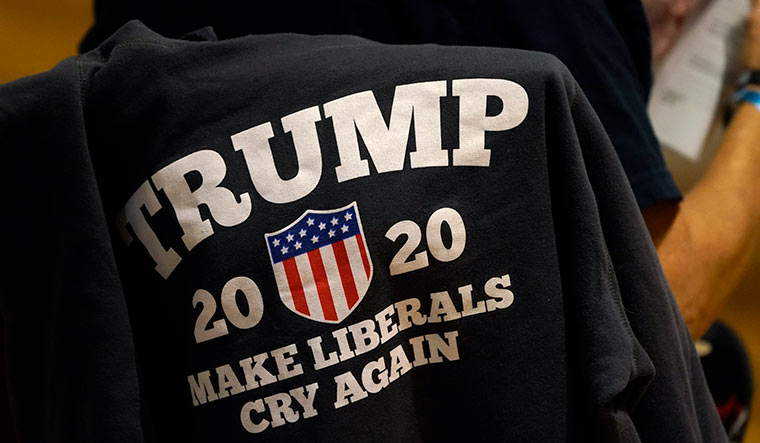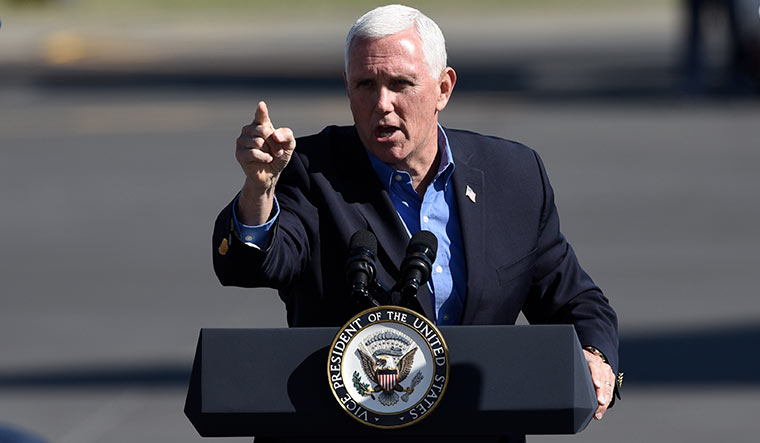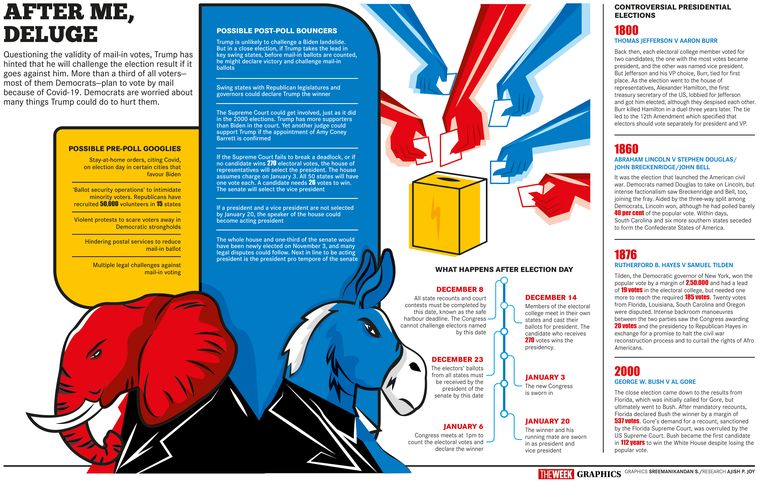Four years after winning the presidency by convincing Americans that he would build a wall along the entire southern border of the United States and make Mexico pay for it, Donald Trump is back on stage, promising to give Americans a stimulus package and make China pay for it. The cheers are deafening and Trump is dancing. Never mind he could not build the wall and Mexico mostly laughed at the suggestion.
Trump, who said he knew more about Islamic State than his generals and more about viruses than his infectious disease expert Anthony Fauci, is on a roll. “The pandemic is ending. We are rounding the corner,” he says at a rally, without a hint of the deception that unnerves his critics. The mostly unmasked, socially close crowd goes wild. Never mind the 8.4 million Americans infected by the virus and the 2,25,222 dead, the highest tally globally.
Then he calls for the jailing of Barack Obama, Joe Biden and Hillary Clinton for good measure. “Lock them up, lock them up, lock them up,” the chants get louder. Trump wants to lock up the entire Biden family. Never mind the criminal investigations conducted by Trump’s own justice department turned up nothing.
The Covid-dominated election season in the United States is a remarkable split-screen. On the one hand, there are raucous rallies featuring Trump. On the other, people show up at 4am in early voting centres that open at 8am. They come with chairs, blankets, breakfast, patience and a lot of determination. In Georgia, they have stood for 11 hours to vote. Early voting is up by 400 per cent in Illinois and by 101 per cent in North Carolina. They stand several feet apart in lines several blocks long. They are mostly masked, careful people who believe in the American tale of democracy and the advice, “If you don’t like the way things are going, vote”. And they are not the same people who are cheering for Trump.
Trump changed America four years ago. In the five years since he announced his unlikely campaign, everyone including the media has struggled to have a good sense of what is happening. Trump’s political obituary was written after each one of his blunders, which would have killed any other campaign. The media is still at a loss to explain the things Trump does, how they work and why they work.
Trump filed for re-election the day he was inaugurated as president, much earlier than any other candidate in history. Much of the respect and admiration for pre-political Trump came from 14 seasons of the television show The Apprentice in which he was the star, director and producer. It earned him hundreds of millions of dollars and positioned him as a master dealmaker and decisive multi-billionaire, an evaluation which is disputed by those who have analysed his extensive and complicated personal finances.
The key to the show’s success was its masterful stagecraft. The difference between what is real and what is appearance is of greater importance in politics than in show business. Fiduciary norms apply to the actions of political officials. But Trump understands that dramatic effects can blur the line and he uses the tools of theatrical stagecraft to attain the effects he wants. The idea that presidential candidates would respect the rules went out with the rise of Trump. Under him, the American life has become a never-ending play where he is the producer, director and main actor.
Trump has cast his cabinet members as performers and you can almost see behind the scenes as he tells them how to speak his lines: “This is the largest audience ever to witness an inauguration, period,” said Sean Spicer, Trump’s first press secretary at his first news conference, arguably stretching the truth about the size of the crowd that attended Trump’s inauguration, and shrinking his credibility and reputation in the process. It started in Trump’s 2016 campaign rallies. His theme was victimhood, invoking the stereotypes of the evil stranger and made-up two-dimensional villains with easy, if sophomoric, nicknames like Crooked Hillary, Lyin’ Ted and Pocahontas. This time it is Sleepy Joe and Phony Kamala. They mark what critics say is an apparent pathological desire to create an alternative reality with no regard for the weight of responsibility in his power.
Trump is masterful in getting his followers to conjure an illusion that becomes their reality. It does not have to be even close to reality — as when he says his Covid response is the best in the world — but the audience has to accept the illusion. That he achieves it regularly, albeit with an ever-shrinking audience, is quite remarkable. Comparing himself to the son of God and striding before his crowds like God himself, Trump knows how to give them all the material they need to find a transformative experience in his words.
Words can be representative and symbolical and can be used to mean something other than their literal meaning, and have a larger impact than literal words allow. It provides plausible deniability, an old political trick — saying one thing and meaning many things that work on more than one level of meaning despite the unawareness of those listening and acting on those meanings.
Whether by instinct or by design, Trump’s words and attack lines are fraught with distilled political tropes strong enough to resonate with people’s predispositions and branch out from there in ways Trump himself cannot know where they will lead.
“What you are seeing and what you are reading is not what is happening,” Trump tells his rallies. “Don’t believe the crap you see from these people, the fake news.” Then he says Covid-19 will go away “like magic”. In every speech, the subliminal message is that the power lies in the people to make the magic work.
Watch any Trump rally for a few minutes, and you will see him railing against being “controlled” by the deep state and against political correctness (read equality, racial harmony and non-discrimination). He does not speak the adorned language of politicians but taps into words and dog whistles that reveal a truth about his audience. He is a hero to his people who revel in his resistance. It is in that cauldron that adulation becomes adoration.
“He is pretty darn honest, he is strong, he talks in plain English, and he does not beat around the bush… no bullshit,” says Trump supporter Patti Castro of Delavan of Wisconsin. “It is the real language of man,” she says, appreciating Trump for talking the way people naturally talk, without the caveats and appropriateness of political language.
“The whole world envies us,” says Trump from the stage, and the crowd roars in approval. But the opposition suspects the whole world may be laughing at the US.
Important heads of state have pretty much stopped visiting the White House and Trump no longer goes to them either, says Steve Baker of Gainesville, Florida, who is the founder of Friends of the Middle, a group dedicated to finding common ground. “For some reason — maybe all the laughing in Trump’s direction — they just could not seem to get along, despite the importance of doing so. My guess is that they decided they could not trust the fool-in-chief.”
Ann Horton, a physician’s assistant from Statesville, North Carolina, says Trump is Russian President Valdimir Putin’s puppet. “A list of traits like misogyny, racism, fear-mongering, power-thirst, sadism, bullying and xenophobia have made a mockery of the US and the presidency worldwide,” she says.
Presidents in the past have grown into the job. They have gone through a great arc of development of their own character, becoming wise by acknowledging their initial ignorance and realising the value of their experience as human beings and world leaders. Trump, who refuses to acknowledge any errors and personal flaws, shows no sign of such a move, say his critics. In fact, his rhetoric and actions have a definite anti-knowledge, anti-science tinge.
The opposition in its naiveté initially thought that a man like Trump could never be elected president. But the Democrats and their allies are now consciously aware of their ignorance and lack of imagination and are prepared for the cruel ways in which Trump could work.
“Vote for Joe Biden like your lives depend on it,” says former first lady Michelle Obama in a video message, in an all-out effort by the Democrats to ensure that the complacency of 2016 is not repeated. “We can no longer pretend that we don’t know exactly who and what this president stands for. Search your hearts and your conscience,” she says.
A slow, seething anger is quietly spreading across America among independents, Democrats and even a widening swath of Republicans who see Trump’s handling of the Covid-19 crisis as utterly incompetent. “Seven months later, he still won’t wear a mask consistently and encourage others to do the same, even when those simple actions could save countless lives,” says Michelle. “Instead, he continues to gaslight the American people by acting like this pandemic is not a real threat.”
A feeling has set in that Trump is an actual and present threat to American lives. Baker says his support for Biden is less about enthusiasm for the Democratic candidate than an absolute unacceptability of Trump. The president’s lies are the real problem, he says: “There are petty ones and there are terrible, tragic lies — like the ones he chose to tell that concealed the real danger of Covid-19 from the American people.”
There are millions in America who think like Baker. “I can’t stand Joe Biden. He is old, inarticulate and creepy as hell — basically everything I wouldn’t want in a president,” wrote Madeline Phaby, assistant news editor of The Miami Student, the official student-published newspaper of Miami University in Oxford, Ohio. “And yet, filling in the circle next to his name on my absentee ballot was one of the easiest things I have ever done,” wrote Phaby in an op-ed. Ohio is a crucial swing state which has determined the fate of several presidential elections.
There is a moral calculus in voting for Biden. Considering his age, Biden may be a short-time president. But the Democrats see promise and energy in his running mate Kamala Harris, who for them is a symbol of a return to a vision of America as a multiracial, multiethnic, multicultural and more accepting place that respects women and appreciates the kinder, motherly embrace women contribute to society. But the Democrats also quietly remind each other that Hillary Clinton had a comfortable lead going into the elections four years ago. The post-traumatic-stress is still palpable among the long lines for early voting.
The Democrats worry that Trump and the Republicans may yet try something Machiavellian to remain in power. They draw comfort from the fact that even a few prominent Republicans have announced their support for the Biden-Harris ticket and have put together a political action committee to point out what they see as the danger Trump poses to America.
“I have been a Republican for over 40 years,” says former Republican party chairman Michael Steele. “I’ll be damned if I am going to cede that ground to Donald Trump, who is not now nor has ever been a Republican, who is not now nor has ever been a conservative. [If you] want to play this little game that Donald Trump is like you, you are stupid. You are being played. You are getting punked. But what is so bad is that you are complicit in your own punking,” says Steele.
The Democrats have realised that no one “can afford to rest easy until the race has officially been called in Biden’s favour”, according to a post in Baker’s group. “I am hopeful,” says Baker. “It appears that what must be the dumbest populace on the face of the planet, after four years of the stupidest person [to ever lead] a country, has finally decided that Trump must go and plans to vote in record numbers.” Agrees Horton, “We will again become, albeit wounded, the United States of America. We will again care about each other, the environment, our world view. And we, as citizens, will hold these damn politicians accountable,” she says.
It may, however, not be so straightforward. For months now, foreseeing a large mail-in vote due to the pandemic, Trump has been on a campaign to discredit the process and hinder the operations of the US Postal Service —by even overtly withholding funds — in order to ensure that it cannot handle the overflow of ballots. For the first time in history, Trump has named a political appointee as postmaster general, who has promptly moved to decommission mail sorting machines, take out mail drop boxes and reduce overtime for employees, in an attempt to delay votes from being cast and counted.
The president’s rhetoric against mail-in votes has been vicious, qualifying them — without evidence — as part of a massive voting fraud. But it has spurred more than 30 million Americans so far into voting early. “We are going to brave the lines. As there are all kinds of lawsuits to stop the acceptance of mail-in ballots, we have no choice. He has destroyed the postal service,” says Horton. Grammy winning Atlanta songwriter Johntá Austin says this is the most important election of their lives. “If your vote was not important, they would not be going to such great lengths to take it away from you.”
Luck and timing have always been on Trump’s side. Getting an opportunity to add a third supreme court justice is morbid luck. Three days after the death of liberal icon Justice Ruth Bader Ginsburg, Trump offered the nomination to Amy Coney Barrett, a federal judge on the US court of appeals for the seventh circuit, openly musing about the possibility of her having to decide his election-related case.
In the 2000 presidential elections between George W. Bush and Al Gore, a lawsuit by the Republican party to stop the recount in Florida and declare a winner was ultimately upheld by the supreme court. Tradition has been that a justice with an allegiance or debt to a litigant would recuse from the case, but in the Trump world, there is no place for such niceties. He tirelessly chastised his first attorney general Jeff Sessions for recusing himself from investigations into Russian interference in the 2016 elections after revelations that he had two undisclosed meetings with the Russian ambassador. Trump forced Sessions to resign and then openly campaigned to undermine his bid to return to the senate.
Trump is a lifelong expert on taking litigation down to the wire. American courts are littered with Trump lawsuits which served the purpose of wearing down the other side financially or otherwise. “The chess pieces have been moved and set up in preparation to contest any election results Trump decides he does not like,” says Baker. “He has called the process ‘corrupt’ and subject to ‘cheating’ since he was elected. The heat has been turned up steadily as the elections approach.” Trump himself declined to guarantee a peaceful transfer of power before giving a qualified answer, “If it is a fair election.” The Democrats fear that the president plans to unleash mayhem to stay on in the White House even if he loses the elections.
Trump’s angry debate performance was also an indicator of his desperation. When asked to condemn white supremacists, he gave the Proud Boys, a far right group notorious for violence, a new rallying cry, “Stand back and stand by”. The group says the president’s words mean “wait for my orders”. “If Trump does not get re-elected, there is going to be a riot... you are going to see a civil war.”
Add to the mix QAnon, a Trump-supporting virtual cult, which says the Democrats support paedophilia and drink children’s blood, and sees Trump as a messiah who is there to save the children. Many suburban mothers see Trump as the hero of the story. For his part, Trump, when asked about QAnon, said he did not know about the group, but said it opposed paedophilia. And, supporters like Castro are prepared to believe whatever he says. “Trump is bringing the constitution back to where it was, the fundamentals like the right to bear arms,” says Castro. “That is our constitutional right, which they want to take away.”
For Trump, the stakes are big beyond politics. Upon leaving office, he would lose the legal protections of presidency. There are criminal and civil investigations under way — New York prosecutors are investigating the Trump organisation for bank fraud, obstruction of justice and campaign finance violations. There is a civil tax liability related to a $72 million tax refund and there are lawsuits for defamation.
Lately, Trump has been joking that if he loses the election, he may have to “leave the country” out of embarrassment. Some see that as testing the waters and setting the scene for an exit to avoid arrest.
Since the beginning of the investigation into Russian interference in the 2016 elections, Trump has been discussing the possibility of pardoning himself preemptively. A string of pardons that did not go through the usual justice department investigation and recommendations seems to have laid the groundwork for one final pardon for Trump and his family.
Trump’s bitter despair as the campaign comes to a close — frantically holding dozens of rallies ignoring Covid protocols — shows us a world in which ordinary citizens are perhaps puny and insignificant to the great events that condemn the fate of a nation. The tragedy of pandemic-ravaged America is that Trump’s rosy predictions for the defeat of Covid cannot succeed. Containing the pandemic does take serious, consistent, coordinated work and vigilance, the kind that New Zealand, South Korea and even Wuhan managed to achieve.
But the events that drive America’s fate may yet be in the hands of Biden and Harris. The Democrats have chosen the path of controlled reason, mature language and careful, deliberate action utterly faithful to American ideals, which they feel Trump has cast by the wayside. The juxtaposition of characters is at the very heart of what is happening in America today.
Tragedy, if it is to come, is dominated by fate. And whatever fate America chooses will come at a cost for Americans.



